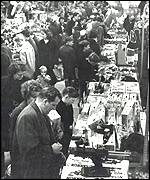|
Amid so much gloom, is it any wonder shoppers
worry?
by BBC News Online's James Arnold
To the average person, bamboozled by talk of current-account deficits, exchange rates and bond yields, consumer confidence seems the sort of economics anyone can grasp. Yet few indicators are as potentially deceptive - or as economically crucial.
Almost everywhere, these figures are expected to show a catastrophic-seeming plunge in sentiment. But just how catastrophic is the collapse in confidence, and how much real effect does it have on our economic fortunes? Shopping: Your patriotic duty Consumer spending is certainly the foundation of many economies. The long boom of the mid to late 1990s was built on buoyant spending - especially in the US and UK, where service industries have long replaced manufacturing as the main economic motor.
Policy-makers, especially in the US, have queued up to urge consumers to get back to the shops. This vital economic role has pushed the various indicators of consumer confidence into a leading position among investors' numbers to watch. In the US, every blip and dip of the University of Michigan's monthly consumer survey - the next release of which is due out on Friday - is chewed over obsessively by market pundits. Lies, damned lies and statistics But just how important are these confidence numbers? Although no one questions the statistical rigour of the Michigan survey, or of its equivalents elsewhere in the world, experts counsel caution when jumping to economic conclusions. First, consumer confidence is what economists call a lagging, rather than leading indicator. "Consumer behaviour is like an oil tanker: it can take a very long time to turn around," says Peter Lunt, a senior lecturer in economic psychology at University College London. That is partly because consumers do not necessarily have the full range of economic information, either out of ignorance or because they are sceptical of what they hear from the media. And the confidence lag is also a function of the fact that consumers cannot turn their economic habits around overnight. Most consumers ramp up their debt during a boom period, for example, and are rarely nimble enough to pay it off quickly when the climate takes a turn for the worse. Things change And the role of consumer confidence may also have changed since it first started to be calculated in the 1950s.
Now, Mr Lunt says many younger consumers are happy to have a little instability, because it offers possibilities as well as drawbacks. An unstable labour market, for example, may mean people fear being sacked, but it also offers the chance for profitable job-hopping. This increase in "risk-seeking" behaviour, economists say, means that unconfident consumers are not necessarily unhappy ones. And while people may well be better-informed these days about general economic issues, they are also generally less concerned about society as a whole. "As the old collective notions give way to more nuanced, individual thinking, the whole issue of confidence is much harder to predict," says Mr Lunt. Strange times Yet another unguessable variable is the fact that the present situation is highly out of the ordinary.
Anecdotal evidence, however, suggests that a blast of bad news - the death of Princess Diana in the UK, for example, or the assassination of US president John F Kennedy - has a marked effect on spending. In one of the few consumer surveys to have been completed since the attacks, the Consumer Board, a US analysis firm, found that a surprisingly small 10% of Americans were planning to cut back on spending. "While nearly 90% of consumers say they will not cut back on their buying plans, it's important to note that this figure is very likely to fall as widespread layoffs begin to materialize," says Lynn Franco, director of the Conference Board's Consumer Research Center. Bounce back soon But strip out the existing troubles of the global economy, and the emotional effects of the attacks will not last - at least in markets some distance from the scene of the attacks. "The effect [of the US attacks] on consumer spending can only be temporary," says Gerrit Antonides, professor of economic psychology at Erasmus University in Rotterdam. That is mainly, of course, because the post-event dip in sentiment is in many cases irrational, albeit understandable. As even New York gets back to work, and the media coverage eases, daily economic realities eventually exert themselves again. Back to the recession None of this avoids the fact that the world economy was pretty much heading towards recession before the attacks, so consumer confidence could have been expected to take a tumble in any case.

But if consumers do become more gloomy, the results may not be entirely predictable. "A drop in consumer confidence almost never causes a simple drop in consumer spending," says Mr Antonides. Spending differently, not less What it does produce, says Mr Antonides, is a fall in spending on durables; consumers put off upgrading their car, or buying a new washing machine.
Other goods benefit, notably "comfort products" - everything from chocolate and alcohol all the way through to books and home furnishings. Overall, the amount of money passing through cash tills may not change that much - a fact that makes the wholesale sell-off of consumer-oriented shares seem something of an over-reaction. Indeed, a little judicious spending, psychologists reckon, can be a great comfort to consumers at a time of stress. Retail therapy may not just be good for the economy, it could be good for you too. |
© MMIII | News Sources |
![]()


